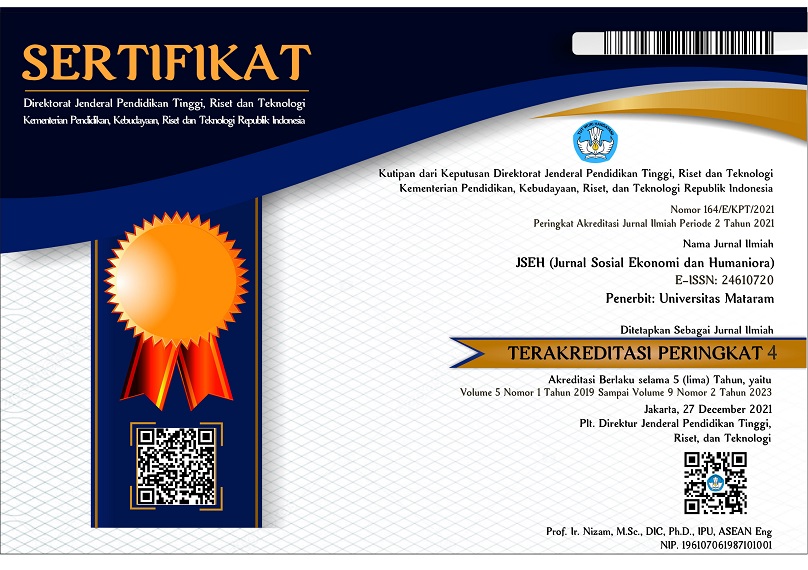Motivasi Konsumen dalam Pembelian Tiket Konser NCT: Studi pada Penggemar K-Pop di Indonesia
DOI:
https://doi.org/10.29303/jseh.v11i1.734Keywords:
Concert, consumer motivation, K-Pop, Popular CultureAbstract
The phenomenon of music concerts, particularly K-Pop concerts, has experienced a significant increase in Indonesia. Fan decisions regarding the purchase of concert tickets are driven by a variery of motivations. This study aims to analyze the factors influencing NCTzen’s decision to attend NCT concerts, utilizing consumer motivation theory and Maslow’s hierarchy of needs. A qualitative research method was employed, involving in depth interviews with four concert attendees. Data analysis was conducted using the data analysis framework developed by Miles & Huberman. The findings indicate that concert ticket purchase decisions are influenced by both rational and emotional motivations, with emotional factors being predominant. The study concludes that concerts serve not merely as entertainment, but also as an integral part of fans’ lifestyle and social identity.
References
Choi, H. (2021). Digital Transformation in K-Pop: How Fourth Generation K-Pop Idols Are Changing the Game. Asian Popular Music Review.
Howard, K. (2017). Popular Music in Korea: Globalization and Innovation in the Korean Wave. Cambridge University Press.
Johnston, C. (2022). Post-Pandemic Revival of Live Concerts and Fan Behavior. Journal of Entertainment Studies, 29(3), 45-62.
Kim, C. (2016). NCT Debut Announcement. SM Entertainment.
Kim, Y. (2020). The Globalization of K-Pop: A Study on BTS and the Role of Big Hit Entertainment. Korea Journal of Popular Culture.
Kotler, P., & Scheff, J. (1997). Standing Room Only: Strategies for Marketing the Performing Arts. Harvard Business School Press.
Kremer, M., & Hammond, S. (2013). A Theory of Human Motivation: Revisiting Maslow’s Hierarchy. Journal of Organizational Behavior, 34(2), 55-68.
Lie, J. (2015). K-Pop: Popular Music, Cultural Amnesia, and Economic Innovation in South Korea. University of California Press.
Maslow, A. (1943). A Theory of Human Motivation. Psychological Review, 50(4), 370-396.
Miles, M. B., Huberman, A. M., & Saldana, J. (2014). Qualitative Data Analysis: A Methods Sourcebook. SAGE Publications.
Mutaali, I., & Prastiti, R. (2019). The Influence of Fanaticism on Consumer Behavior: A Study on K-Pop Fans in Indonesia. Journal of Consumer Research, 12(1), 89-103.
Nazir, M. (2015). Metode Penelitian. Ghalia Indonesia.
Pratama, R., & Susilo, A. (2023). Industri Musik Pasca-Pandemi: Tren dan Tantangan. Indonesian Journal of Music Studies, 15(1), 22-39.
Salim, T. (2019). The Evolution of Concert Culture in Southeast Asia. Asian Journal of Cultural Studies, 7(2), 78-94.
Schiffman, L. G., & Kanuk, L. L. (2000). Consumer Behavior (7th ed.). Prentice Hall.
Setiadi, N. J. (2003). Perilaku Konsumen: Konsep dan Implikasi untuk Strategi dan Penelitian Pemasaran. Kencana.
Sigit, R. (2002). Psychological and Emotional Factors in Consumer Purchasing Behavior. Indonesian Journal of Marketing Studies, 10(2), 45-60.
Sumarwan, U. (2002). Perilaku Konsumen: Teori dan Penerapannya dalam Pemasaran. Ghalia Indonesia.
Suryani, T., & Rahman, A. (2023). Music Concerts as a Driving Force for Tourism and Local Economy in Indonesia. Journal of Economic and Cultural Development, 18(4), 65-82.
Wijaya, H. (2018). K-Pop and Its Influence on Indonesian Pop Culture. Indonesian Journal of Media Studies, 12(1), 33-50.
Downloads
Published
How to Cite
Issue
Section
License
Copyright (c) 2025 Novaldha Andianthie Putri, Joe Harrianto Setiawan

This work is licensed under a Creative Commons Attribution-NonCommercial 4.0 International License.







